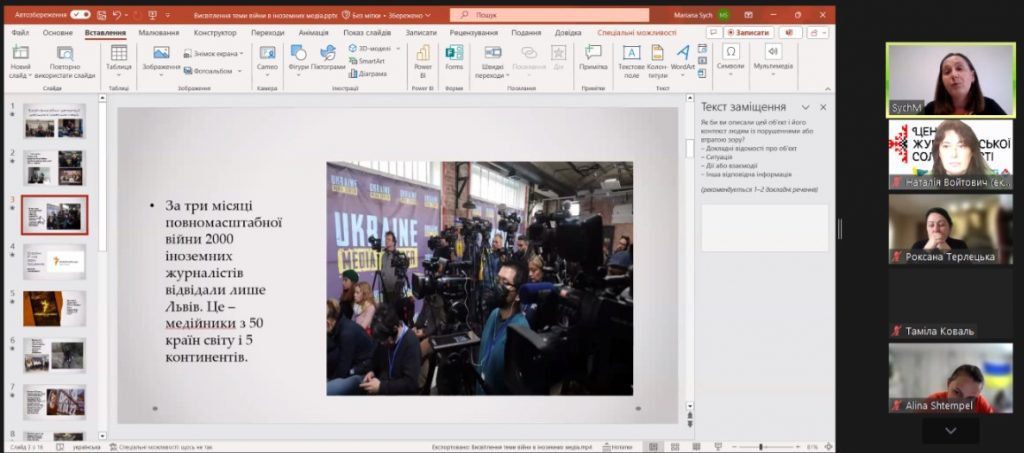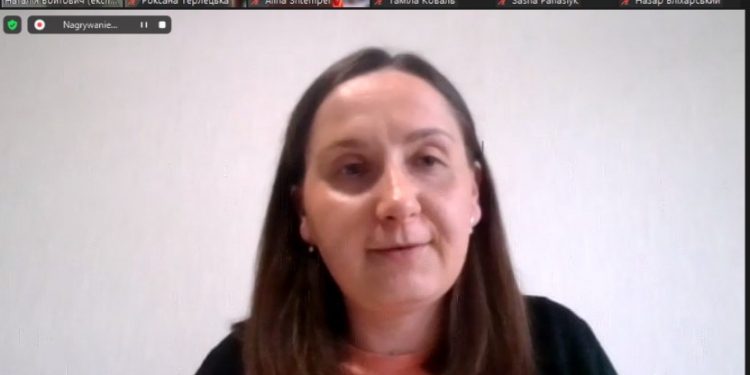How foreign media cover the russian-Ukrainian war, how journalists take care of their own safety while working in the war zone, as well as the peculiarities of covering the deportation of civilians, were the issues talked about by Mariyana Sych, a journalist of the international media of Radio Liberty. The meeting was held with the assistance of the Western Ukrainian Journalists’ Solidarity Center (JSC) of the National Union of Journalists of Ukraine (NUJU).
Mariyana talked about the work of Radio Liberty and the main principles of the media. Cooperation with foreign journalists was also discussed at the meeting. During the first three months of the full-scale invasion, 2,000 foreign journalists visited Lviv alone. These are media people from 50 countries and five continents. However, now, the interest in Ukraine from foreign media has decreased significantly. Therefore, Ukrainian journalists need to work hard to support this topic.
Mariyana talked about how to communicate with people who have experienced traumatic experiences and shared her own experience of communicating with them. The journalist also spoke in detail about the project which she works on called How Are You? The project was launched on Radio Liberty on February 21, 2023. The focus of the project is on the stories of displaced people: refugees, internally displaced persons, and people deported by russia.
“My goal as a journalist is not to traumatize a person. There are times when you need to stop the conversation and not exert pressure on the person. You need to be very careful and tolerant towards your interlocutor. Sometimes, you need to take small breaks. When creating any material, you must always remain human! It is important to understand the value of your material, and the main thing is to understand what you are creating it for because every text or story has a purpose,” said Mariyana Sych.

They also discussed the issue of journalists’ trips to the war zone and their personal safety. Mariyana noted that every journalist working in dangerous or potentially dangerous areas must carry a bulletproof vest and personal protective equipment. In addition, they must undergo medical training and cyber security training. Both are very important for the work of a journalist. Knowing the basics of medicine and being able to provide first aid is very important, even in the relatively peaceful city of Lviv. Because of the numerous air alerts, danger is always present. Mariyana told about cases when Radio Liberty journalists provided medical aid to soldiers after artillery fire and even applied tourniquets to themselves. Regarding cybersecurity training, the speaker noted that it is very important to carefully protect the information you collect. In addition, it is important that journalists have insurance.
“Talking about Ukraine is important for both Ukrainian journalists and media workers abroad. In order for Ukraine to remain at the top of the international information space, it is necessary to write a lot about it. Radio Liberty journalist Mariyana Sych told us about how foreign media do it today. A very valuable and really interesting session. For us journalists, it is important to hear the opinions of our colleagues and learn about their experiences. I was particularly impressed by the project led by Ms. Mariyana How Are You? Grateful to the organizers for a great meeting, and to the speaker for new knowledge and advice!” notes the journalist and editor of the news feed of the StopCor news agency, Valeriya Markush.
Mariyana Sych also gave some advice to journalists:
Take care of your mental health! Do not be afraid to contact a specialist if necessary. Mental health is the key to your inner peace. You have to be in the resource to work for your audience. You don’t have to torture yourself. If it’s difficult, find time to rest. Because only when you feel good you can work efficiently and productively. Remember this!
Always pay attention to personal safety. If you go to dangerous areas, you must have personal protective equipment. Don’t neglect it!
Don’t be afraid to tackle topics that are new to you, even if they are difficult. When you feel that it is really yours – discard fear and act!
Learn to work in different media programs because experience shows that very often, you need to be able to write large material and edit a story (even on the phone). When time is short, you will do it yourself. Convergence and the ability to adapt to different conditions are very important in our profession.
REFERENCE INFORMATION. Mariyana Sych is a journalist for the Radio Liberty project How Are You? It is dedicated to refugees and internally displaced persons. Before that, she worked as an investigative journalist, collaborating with Bihus.Info and Suspilne Lviv teams. She studied at the Faculty of Journalism of Ivan Franko National University of Lviv.
Call the Western Ukrainian Lviv-Chernivtsi JSC at 097 907 9702 (Nataliya Voitovych, the Lviv JSC, Volodymyr Bober – assistant). The Center’s address is 5 Solomiyi Krushelnytskoyi Street.
ABOUT JSC
The Journalists’ Solidarity Centers is an initiative of the NUJU implemented with the support of the International and European Federations of Journalists and UNESCO. The initiative is designated to help media representatives working in Ukraine during the war. The Centers operate in Kyiv, Lviv, Ivano-Frankivsk, Chernivtsi, Zaporizhzhia, and Dnipro and provide journalists with organizational, technical, legal, psychological, and other types of assistance.
ABOUT UNESCO
UNESCO is the United Nations Educational, Scientific, and Cultural Organization. It contributes to peace and security by promoting international cooperation in education, sciences, culture, communication, and information. UNESCO promotes knowledge sharing and the free flow of ideas to accelerate mutual understanding. It is the coordinator of the UN Action Plan on the Safety of Journalists and the Issue of Impunity, which aims to create a free and safe environment for journalists and media workers, thus strengthening peace, democracy, and sustainable development worldwide. UNESCO is working closely with its partner organizations in Ukraine to provide support to journalists on the ground.
The designations employed and the presentation of material throughout this digest do not imply the expression of any opinion whatsoever on the part of UNESCO concerning the legal status of any country, territory, city, or area or its authorities or concerning the delimitation of its frontiers or boundaries.
The authors are responsible for the choice and the presentation of the facts contained in this digest and for the opinions expressed therein, which are not necessarily those of UNESCO and do not commit to the organization.
Alina Shtempel

 THE NATIONAL UNION OF
JOURNALISTS OF UKRAINE
THE NATIONAL UNION OF
JOURNALISTS OF UKRAINE
















Discussion about this post